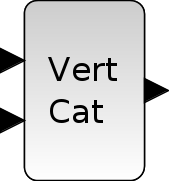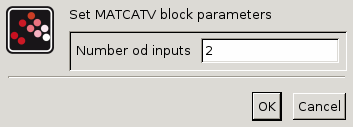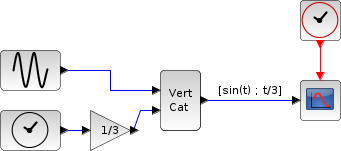MATCATV
Vertical Concatenation
Block Screenshot

Contents
Description
The MATCATV Block outputs the vertical concatenation of multiple matrices. It is also called concatenation according to the rows. The inputs U1,U2,...,Un must have the same number of columns. The user must set the number of input matrices in the Number of input parameter.
The output is a (M1+M2+...+Mn)-by-N matrix, where M1,M2,...,Mn are the numbers of rows of the inputs matrices, and N is the number of columns.
The equivalent of MATCATH in Scilab is y=[U1;U2;...;Un]
Parameters

Datatype(1=real double 2=Complex)
It indicates the type of the output. It support only the two types double (1) and complex (2). If we input another entry in this label xcos will print the message "Datatype is not supported".
Properties : Type 'vec' of size 1.
Default properties
always active: no
direct-feedthrough: yes
zero-crossing: no
mode: no
regular inputs:
- port 1 : size [-1,-2] / type 1
- port 2 : size [-1,-3] / type 1
regular outputs:
- port 1 : size [1,1] / type 1
number/sizes of activation inputs: 0
number/sizes of activation outputs: 0
continuous-time state: no
discrete-time state: no
object discrete-time state: no
name of computational function: mat_catv
Example
A = [1 2; 3 4; 5 6] B = [7 8; 9 10] The result of the vertical concatenation is: C = [1 2; 3 4; 5 6; 7 8; 9 10]
Example of Vertical Concatenation

Interfacing function
SCI/modules/scicos_blocks/macros/MatrixOp/MATCATV.sci
Computational function
SCI/modules/scicos_blocks/src/c/mat_catv.c
SCI/modules/scicos_blocks/src/c/matz_catv.c
See also
| Report an issue | ||
| << MATCATH | Matrix operation palette | MATDET >> |